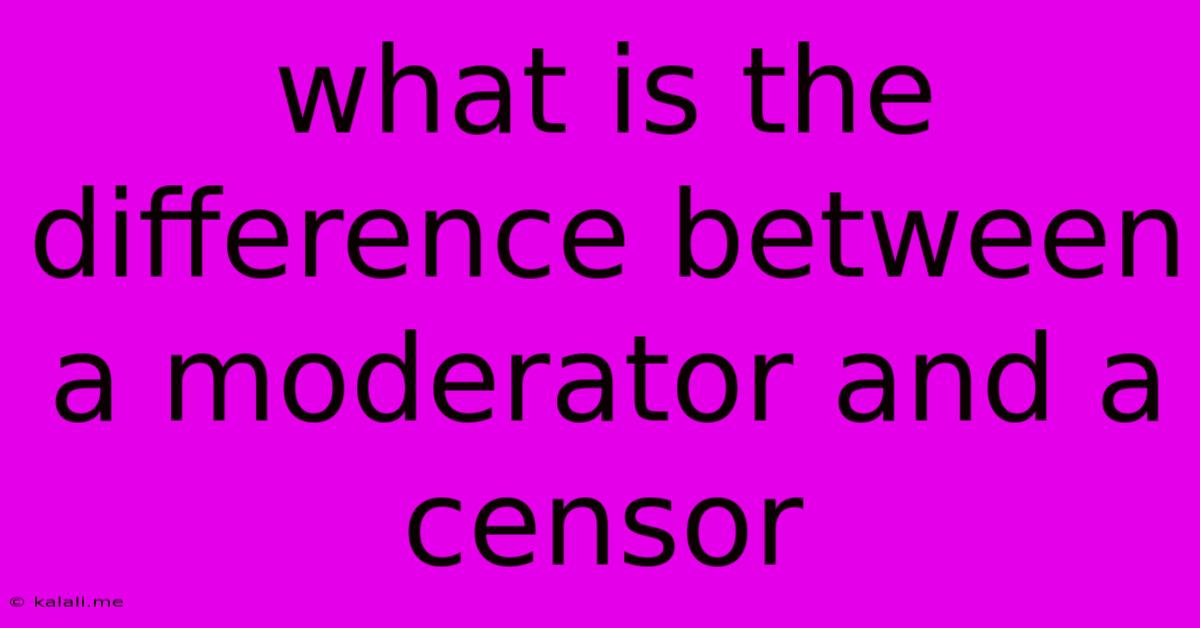What Is The Difference Between A Moderator And A Censor
Kalali
Jun 02, 2025 · 3 min read

Table of Contents
What's the Difference Between a Moderator and a Censor?
Meta Description: Understanding the key differences between moderators and censors is crucial for online communities. This article clarifies their roles, responsibilities, and the ethical considerations involved in online content management.
Navigating the digital world requires understanding the roles responsible for maintaining online spaces. While both moderators and censors manage content, their approaches and philosophies differ significantly. This article will explore these crucial differences, highlighting the nuances between these two often-confused positions.
The Role of a Moderator
A moderator acts as a facilitator and guardian of online discussions and communities. Their primary goal is to foster a positive and productive environment where users can freely express themselves while adhering to established community guidelines. Think of them as the helpful guide ensuring everyone follows the rules of the road, allowing for a smooth and enjoyable journey for all participants.
Key Responsibilities of a Moderator:
- Enforcing Community Guidelines: Moderators ensure users comply with pre-defined rules and regulations set by the platform or community. These guidelines typically address issues such as hate speech, harassment, spam, and inappropriate content.
- Mediating Disputes: They step in to resolve conflicts between users, aiming to de-escalate tensions and find amicable solutions.
- Maintaining Order and Flow: Moderators manage the flow of conversations, ensuring discussions remain relevant and on-topic. They might remove off-topic posts or merge similar discussions.
- Promoting Engagement: Good moderators encourage positive interactions and participation, fostering a sense of community and belonging. This might involve highlighting valuable contributions or engaging with users directly.
- Content Filtering (Selective): Moderators might remove content that violates community guidelines, but their focus is on maintaining a healthy environment, not suppressing specific viewpoints. They typically allow a wide range of opinions, provided they are expressed respectfully.
The Role of a Censor
A censor, on the other hand, acts as a gatekeeper controlling information flow based on pre-determined criteria. Their primary goal is to suppress or remove content deemed undesirable by a governing authority. This often involves limiting free expression and can be seen as a form of information control. Censorship typically operates within a broader framework of power structures and can have significant political and social implications.
Key Characteristics of Censorship:
- Proactive Suppression: Censors actively seek out and remove content, often before it reaches a wide audience.
- Broader Criteria: Censorship criteria are often less specific and more subjective than community guidelines, potentially encompassing a wider range of viewpoints or expressions.
- Lack of Transparency: The rationale behind censorship decisions is often opaque, lacking transparency and accountability.
- Power Imbalance: Censorship frequently implies a power imbalance, with a central authority determining what information is permissible.
- Restriction of Free Speech: Censorship inherently restricts the free exchange of ideas and information, potentially silencing dissenting voices.
Key Differences Summarized
| Feature | Moderator | Censor |
|---|---|---|
| Goal | Foster positive and productive community | Suppress undesirable content |
| Approach | Facilitative, responsive | Proactive, controlling |
| Criteria | Specific community guidelines | Broader, potentially subjective criteria |
| Transparency | Generally transparent | Often opaque |
| Power Dynamic | Collaborative, balanced | Authoritarian, unbalanced |
| Impact on Speech | Encourages responsible expression | Restricts expression, potentially silencing |
Ethical Considerations
The ethical implications of both moderation and censorship are significant. Moderation, when done fairly and transparently, can create safer and more inclusive online environments. However, poorly implemented moderation can lead to biased enforcement and stifle legitimate expression. Censorship, even with seemingly noble intentions, poses a substantial threat to freedom of speech and can be used to suppress dissent and control narratives. Striking a balance between maintaining order and protecting free speech is a continuous challenge in the online world. A transparent and accountable system, with clear guidelines and avenues for appeal, is crucial for both moderation and censorship to be ethically sound.
Latest Posts
Latest Posts
-
How To Solve Riccati Equation In Optimal Control
Jun 04, 2025
-
Does A Refrigerator Need A Gfci
Jun 04, 2025
-
How To Make A Double Cream
Jun 04, 2025
-
How To Change Hebrew Font On Word To Rashi Font
Jun 04, 2025
-
Papers Please Do You Have To Highlight Discrepancies
Jun 04, 2025
Related Post
Thank you for visiting our website which covers about What Is The Difference Between A Moderator And A Censor . We hope the information provided has been useful to you. Feel free to contact us if you have any questions or need further assistance. See you next time and don't miss to bookmark.